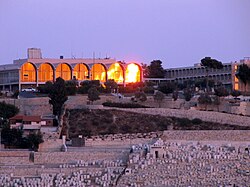| Hotel 7 Arches Jerusalem | |
|---|---|
 | |
 | |
| General information | |
| Location | Mount of Olives, Jerusalem |
| Coordinates | 31°46′32″N35°14′36″E / 31.77555°N 35.24333°E |
| Opening | March 20, 1964 |
| Owner | Jordanian government (originally) |
| Technical details | |
| Floor count | 3 |
| Design and construction | |
| Architect(s) | William B. Tabler [1] |
| Other information | |
| Number of rooms | 196 |
| Number of restaurants | 1 |
The Hotel 7 Arches Jerusalem is a hotel in East Jerusalem in the Arab neighborhood of at-Tur on the Mount of Olives. The hotel overlooks the old city of Jerusalem.
